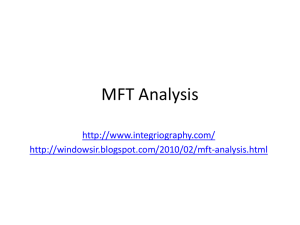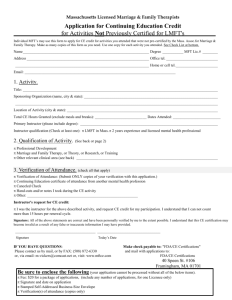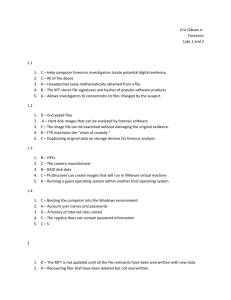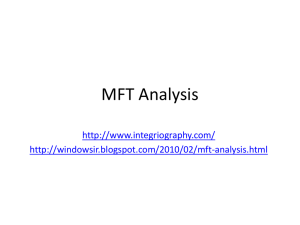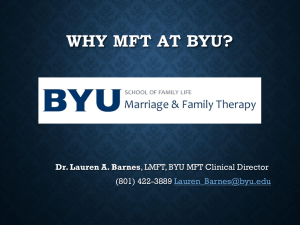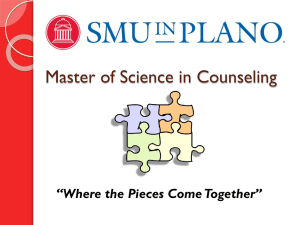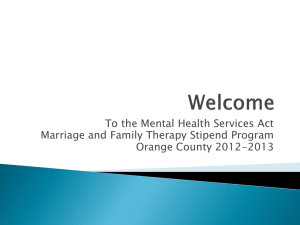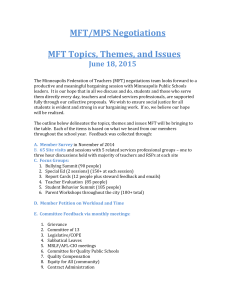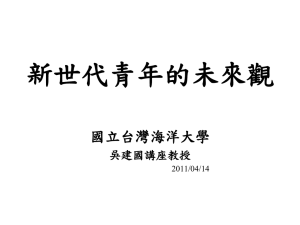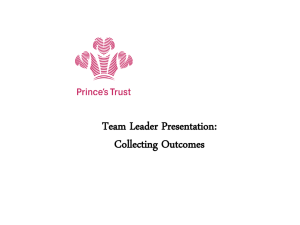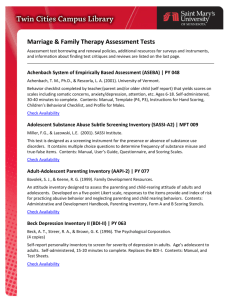Consultant Recommendation - University of Wisconsin
advertisement
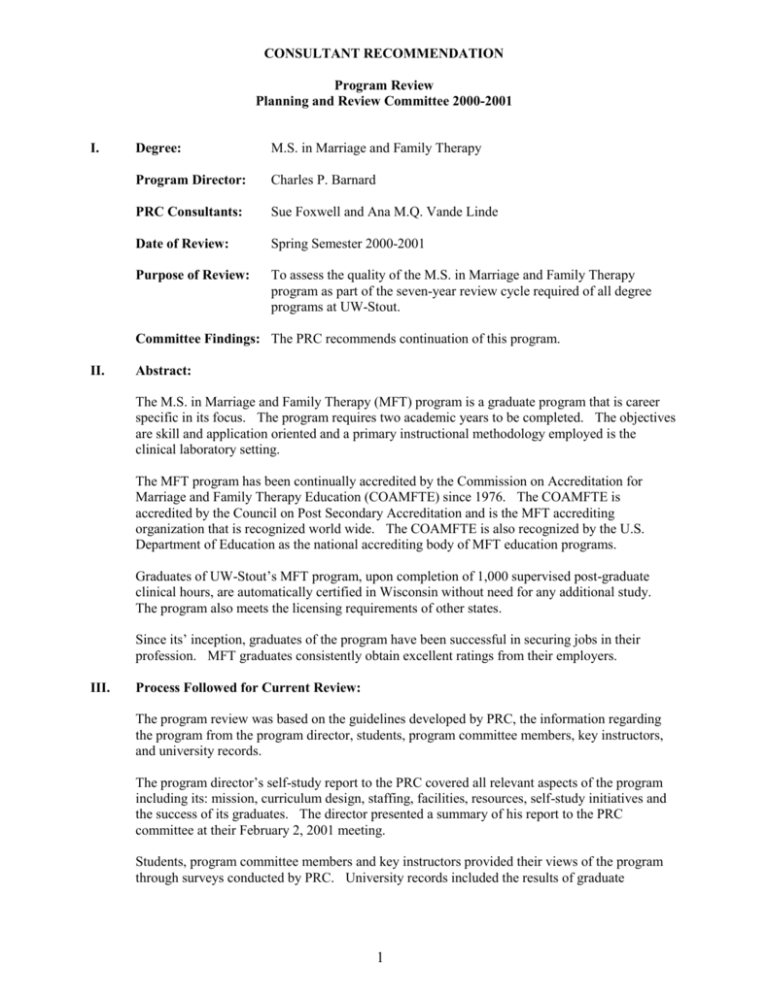
CONSULTANT RECOMMENDATION Program Review Planning and Review Committee 2000-2001 I. Degree: M.S. in Marriage and Family Therapy Program Director: Charles P. Barnard PRC Consultants: Sue Foxwell and Ana M.Q. Vande Linde Date of Review: Spring Semester 2000-2001 Purpose of Review: To assess the quality of the M.S. in Marriage and Family Therapy program as part of the seven-year review cycle required of all degree programs at UW-Stout. Committee Findings: The PRC recommends continuation of this program. II. Abstract: The M.S. in Marriage and Family Therapy (MFT) program is a graduate program that is career specific in its focus. The program requires two academic years to be completed. The objectives are skill and application oriented and a primary instructional methodology employed is the clinical laboratory setting. The MFT program has been continually accredited by the Commission on Accreditation for Marriage and Family Therapy Education (COAMFTE) since 1976. The COAMFTE is accredited by the Council on Post Secondary Accreditation and is the MFT accrediting organization that is recognized world wide. The COAMFTE is also recognized by the U.S. Department of Education as the national accrediting body of MFT education programs. Graduates of UW-Stout’s MFT program, upon completion of 1,000 supervised post-graduate clinical hours, are automatically certified in Wisconsin without need for any additional study. The program also meets the licensing requirements of other states. Since its’ inception, graduates of the program have been successful in securing jobs in their profession. MFT graduates consistently obtain excellent ratings from their employers. III. Process Followed for Current Review: The program review was based on the guidelines developed by PRC, the information regarding the program from the program director, students, program committee members, key instructors, and university records. The program director’s self-study report to the PRC covered all relevant aspects of the program including its: mission, curriculum design, staffing, facilities, resources, self-study initiatives and the success of its graduates. The director presented a summary of his report to the PRC committee at their February 2, 2001 meeting. Students, program committee members and key instructors provided their views of the program through surveys conducted by PRC. University records included the results of graduate 1 follow-up studies and employer surveys. It should be noted that the M.S. in MFT program is concurrently going through a program revision. IV. Previous Review (1993-94): Previous Recommendations V. 1. The failure to hire a female is beginning to impact other areas. The existing diligent effort to recruit qualified female applicants should be continued. Diligence should also be employed in searching for new approaches to resolving this long standing concern. 2. The value of the Clinical Services Center to the program and its students is clear. The requirement that the center have a dedicated space should be honored. This objective is valuable in itself and initiatives leading to this goal should be begun directly. 3. Student requests for the inclusion of studies on a wider range of diversity issues deserves serious scrutiny. As pointed out during the PRC meeting with the principals, current placement trends send graduates into unfamiliar locals and find them offering services to an increasingly diverse set of clients. Student sensitivity to this prospective is to be applauded and course content should be addressed to the degree warranted by their present and/or future needs. Program Review: Program Strengths Source 1. The faculty is exceptional; knowledgeable in providing theory, clinical experiences, current experiences, and current information in the Marriage and Family Therapy Program. Student surveys; Advisory Committee 2. The size of the program (12 students/year admitted to the two-year program) provides for quality interaction and report; student surveys individual attention between faculty and students, as well as between students within a learning community. Program Director’s 3. The program curriculum is strong, combining in Year One, the academic year, theory with Year Two, the report; student surveys clinical year. Program Director’s 4. The MFT program is accredited by the Commission on Accreditation of the American Association for Marriage and Family Therapy (COAMFTE), recognized by the U.S. Department of Education as the national accreditation body of MFT educational programs. UW-Stout has the master’s degree MFT program that has the longest continuing accreditation record (since 1976); an outstanding program quality recognition. Program Director’s report 2 Issues of Concern Source 1. There is a lack of female faculty in the program as well as lack of male students. Program Director’s report; student surveys 2. There is a need to have increased focus on diversity within the curriculum to better enable therapists in training to be prepared for cross-cultural issues and perspectives. Program Director’s report; student surveys; Program Committee Survey 3. Program leadership needs to examine the need for both the “cultural anthropology” and the “cultural competency” courses as students indicated appropriateness and outcomes for “cultural competency” course, but questioned “cultural anthropology” fit. Student surveys; Program Committee survey 4. Examine options in providing structures/formats/guidelines when beginning to work with clients. Student surveys 5. In the last program review, 1993-94, the need for a distinct space of clinical staffing was noted and space has been secured (344 VR) for that purpose. However, the need remains for adequate furniture for that space. Program Director’s report Recommendations for the Program Director and Dean 1. The department chair and program staff should develop a Plan to hire more female staff, preferably as tenure track Faculty. The dean should oversee this process and provide necessary resources for this process. Program Director and Dean 2. The program director and key instructors should review curriculum and course content for diversity concepts; analyzing and determining where best to infuse these concepts; look at hiring a consultant (external to program) for outside point of view. Program Director 3. The program director and key instructors should review Program Director curriculum of the “cultural anthropology” and “cultural competency” course to analyze if both are needed in the program to achieve the goals they are set out to accomplish. The program director should review the principles and concepts of ach course to ensure clarity and non duplication, working with the instructors of each of these courses. 4. The program director and clinical staff should examine how tudents are being initiated into the therapy (hands on) sessions and determine ways to assist students in the transition from theory into practice. Program Director 5. Now that the space has been secured for the clinical staffing (344 VR), adequate furniture needs to be obtained. The department chair, dean, and program director should work together to develop and implement a plan for purchase. Program Director and Dean 3
